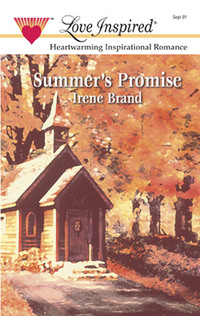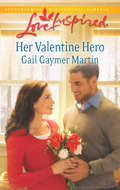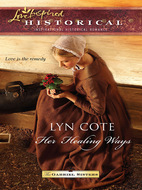Kitap dosya olarak indirilemez ancak uygulamamız üzerinden veya online olarak web sitemizden okunabilir.
Kitabı oku: «Summer's Promise», sayfa 3
Chapter Three
After David left, Summer drank a cup of hot herbal tea to settle her nerves. She’d calmed down somewhat during the movie, but David’s caress had disturbed her. He’d been bestowing lots of affection on her the past two weeks, and to her dismay, she realized she liked it. Summer had many reservations about agreeing to Spring’s request, and not least among them was her hesitancy to be thrown into frequent companionship with David. He was an attractive man, and he was good company, but she had her future mapped out. There was no place in it for David Brown.
Summer changed into a nightgown and went to bed, but sleep eluded her. When she did doze, she dreamed—mostly of Timmy and Nicole and how forlorn they’d looked during their parents’ funeral. In her dreams, the children stood with outstretched arms, looking at her with beseeching eyes. After the secure home life she’d known as a child, she couldn’t imagine what it would be like to suddenly lose your parents.
Awakening at an early hour, anger and defiance replaced the compassion of her dreams. Summer could empathize with her sister’s concern for her kids, but she considered it inexcusable for Spring and Bert to saddle her and David with the responsibility of a school in the hinterlands of North Carolina.
David’s bright and cheerful manner, when he breezed into the apartment at noon, irritated Summer. She’d tried to cover up the ravages of a sleepless night with makeup, but she hadn’t succeeded for David was unkind enough to say, “I told you to get some sleep.”
Lack of rest had made her grouchy, and she said, “Let’s get down to business. What can we do about this dilemma we’ve had dumped in our laps?”
He sat on the couch and stretched his neatly clad legs out in front of him. “What do you want to do about it?”
“I want to ignore it, but I know we can’t.”
“I’ve wondered why Spring kept repeating the children’s names at the hospital. I’ve decided she was trying to tell me the provisions of their wills, but she was too far gone to express herself. If we don’t accept the responsibility, the decisions are going to boomerang to our parents, none of whom are able to take over.”
Stalling for time, Summer walked around the room, adjusting items on the tables. She paused to straighten a wall collage of framed photographs featuring the Weaver sisters and her father’s prize-winning Belgian horses.
“David,” she began earnestly, “listen to my side of the situation. I wanted to come to New York when I graduated from high school, but my parents wouldn’t let me. When I was of age and ready to strike out on my own, Mother had a stroke, and I went home to take care of her. I was there six years, and now, at long last, I’m in New York with my parents’ blessing. I have a good job and a bright future in the financial market. Do you think it’s right for my sister to ask me to give up my life to take on her family, her dreams and her ambition? Surely it’s time for me to live the way I want to. It isn’t fair!”
The forlorn faces of Timmy and Nicole flitted into Summer’s mind, but she willed the images into the background.
“Life often isn’t fair,” David answered in a compassionate tone, “and I do understand your position. As a matter of fact, I’m pleased with my life the way it is now. I don’t want to change, either.”
She glanced at David quickly. If he felt that way, maybe she wasn’t as selfish as she thought she was. “Then you’re willing to refuse their requests?” she asked eagerly.
“Maybe. Since I wasn’t consulted about being the executor, nor either of us about their other requests, I don’t feel we’re obligated. But if I’d told them I’d do these things, I wouldn’t back out.”
David breathed deeply, looked at her with troubled eyes, and spoke in a resigned, yet compassionate, tone. “But I can’t make this decision on what is legally right or wrong. Love for my brother motivates me more than legalities. If the situation were reversed, and Timmy and Nicole were my kids, would I want Bert to abandon them? It’s not an easy decision, Summer.”
The time had come to be honest or live a lie the rest of her life. She leaned against the latticed divider between her kitchen and living area, and after a long pause, Summer looked him squarely in the eyes and said, “It’s not that simple for me. I promised Spring I’d take care of her children.”
David stared at her, and despite the stress of the moment, she was slightly amused to see his surprise. He was usually on top of every situation.
“In the hospital before you came, Spring asked me to look after her kids, and she was so insistent and troubled, I finally agreed.”
“Why didn’t you say so when we were at the farm discussing guardianship of the kids?”
“I intended to, but when you mentioned that they’d probably made wills, I hoped that Spring hadn’t been rational when she made the request and that they’d made different arrangements for the children. That’s the reason I left and came back to New York as soon as I decently could. Every time I looked at Timmy and Nicole, I felt like bolting. I know absolutely nothing about rearing children. I’m not sure I even like children—I haven’t been around them enough to find out. David, I can’t do it, and if I don’t, it will torment me the rest of my life.”
She sat down again, leaned her head on the arm of the sofa and burst into tears. David hadn’t had any experience with crying women, so he didn’t know what he should do. He went to the kitchen and rummaged around in the cabinets. Everything was marked and in place, as he should have known it would be. He heated hot water, poured it into a cup and dangled a bag of a spiced tea blend in it.
He placed the cup on the coffee table and went to the bathroom and dampened a washcloth. He sat beside Summer and touched her shoulder. “Stop crying,” he encouraged. “I’ll help you through this.”
“But I don’t want my family to hate me!” she wailed.
“Wipe your face and drink your tea. We’ll figure out something.”
While Summer alternately sniffed and drank the tea, he tried to formulate a plan of action. How could he advise her when he didn’t know what to do?
“You’re not the only one who’s troubled about this situation,” he said at last. “I’ve got my life ordered the way I want it, and I’ve had a few bitter thoughts about a brother who would write such a will and not even mention it to me. I’m not good at administration, but the thing that bothers me more than anything else is that I’m not spiritually competent to take on Bert’s job.”
“I don’t understand.”
“You know the kind of school they operated, don’t you?”
“Of course. It’s a school for underprivileged and troubled teenagers.”
“But it’s also a Christian school, and while I was a practicing Christian when I was a boy, I’m not now. I haven’t read the Bible for years. I can’t be an administrator at a Christian school without a solid spiritual commitment. What about your faith? Are you qualified for this kind of work?”
Summer leaned back and rested her head on the couch. “My folks didn’t take us to church, so I have very little knowledge of Christianity. Spring became a Christian when she met Bert, and Autumn and Nathan are active in church affairs. I’ve always been the oddball in the family, and it’s the same with spiritual matters. I’d have no idea how to work with teenagers in a mission school.”
“And that may be our way out of this situation,” David said. “Just because Bert and Spring wanted us to take over their school doesn’t mean we can. They were serving under a mission board, and I doubt very much that the board members would allow us to take over the school even if we wanted to.”
Summer brightened, and then her spirits drooped again. “But we’d still be stuck with the kids.” She gasped and covered her face with her hands. “What a terrible thing to say! Don’t I have any compassion at all?”
David sympathized with Summer. When he’d been around the Weaver family, he’d gathered that Summer hadn’t received as much attention as the other two daughters. When she’d been a quiet child, it was easy for her to escape notice.
“I haven’t told your parents or mine about the contents of the wills, but I’d like to go to North Carolina and look over the situation before I turn thumbs down on it. Will you go with me? What we find there may make our decision easier.”
Summer sighed. “When I’ve just gotten that good job at the bank, I hate to ask for any more time off. But I suppose you’re right. Hopefully, my employers will be patient a little longer.”
“Let’s take a plane to North Carolina, rent a car and drive up in the mountains where the school is located. I’ve already established contact with the school’s supervisor, and after we talk to her, she may make the decision for us. I’ll cancel my flight for tomorrow, and we can leave on Monday.”
“That might take care of the school problem, but that won’t solve the guardianship of the children.”
He moved closer to her and stretched his arm around her shoulders. She welcomed his touch as he said sympathetically, “I won’t tell anyone what Spring asked you to do. If you decide you can’t take on the care of Nicole and Timmy, no one will ever know about your promise.”
“I will,” she said drearily. “So I’ll make arrangements to go to North Carolina Monday morning.” She drained the last of her tepid tea and lifted the cup. “Bon voyage.”
On Monday morning when they landed at the Winston-Salem Airport, David arranged for a rental car, and they headed westward on Interstate 40.
“From what I gathered by reading Spring’s letters, this school is located in the boondocks,” Summer said.
“Yes, that’s true. I’ve seen pictures of the place. There are two schools in the compound that’s located near Mountain Glen, a little town in a remote area of Madison County. An elementary school that’s been operating fifty years or so, and The Crossroads, the school Bert and Spring started. Edna Stollard, the woman I talked to, supervises both schools. The mission board that supported Bert and Spring while they were in Bolivia wanted to establish a facility for troubled teenagers, and they asked Bert and Spring to assume the responsibility. It took them almost a year to erect buildings and get the school in operation. I don’t think they have many students yet.”
As they approached the Blue Ridge Mountains, Summer delighted in the awesome scenery and momentarily forgot the decisions facing them.
David was amused at her alternate alarm when they climbed a long steep mountain to her delight when they reached the divide, and Summer clapped her hands like a child, exclaiming over the beautiful vistas before them.
“I’ve seen lots of mountain scenery on television, but you get a whole new perspective when you’re right in the middle of the mountains. Our family’s traveling revolved around horse shows, mostly in the Midwest. I’ve never seen anything as spectacular as this,” she added, peering out the window at the mountain ranges surrounding them. “Have you?”
He smiled affectionately at her. “Traveling with the Air Force, I’ve seen lots of mountains—the Alps and the Andes, and even Fujiyama in Japan. Besides, I grew up in Nashville, and our folks took us to the Great Smoky Mountains National Park almost every summer when we were kids. I like the mountains, too.”
In David’s company, she saw things she never noticed when she was alone, like the flowers along the roadside, cloud patterns, a majestic rock formation or the color of a bird’s feathers. She felt alive when he was around. Why was she a different person when she was with David?
While they had waited in the New York airport, she took a book from her purse to read as she always did, but David struck up a conversation with the people around them, and before they boarded the plane, he’d made himself and several others happy by showing a genuine interest in them. Although Summer hadn’t said a word, she’d laid aside her book to watch David and the people he’d befriended. With David, she realized there was another world beside the one she’d built around herself. If they accepted the provisions of the will, she would be with David most of the time. Glancing at his serene profile, and remembering how she enjoyed his occasional touches, Summer both dreaded and delighted in the possibility of being David’s constant companion.
Observing Summer’s enjoyment of the scenery as they quickly covered the miles, David became more and more infatuated with the person behind the quiet facade Summer normally exhibited. What was there about this reserved, serious woman that drew him to her? Although he didn’t want to act on the request made by their siblings, he would welcome an excuse to see Summer often.
When they neared Asheville, David fished in his coat pocket and drew out a piece of paper. “Here are the directions I got over the phone from Edna Stollard. We travel northward out of Asheville until we come to Mars Hill. From there, you’ll have to guide me.”
Several miles beyond Mars Hill, they traveled westward and upward for a few torturous miles on a narrow road until they reached the small town of Mountain Glen. As the altitude increased, and the trees pressed closely on both sides of the road, Summer stopped talking and a look of panic overspread her face.
Located on the side of a mountain, the town contained several houses and a small business section. David drove carefully along the main street until he saw a sign that pointed to Mountain Glen School. Soon they came to an unpaved road that wound uphill for about two miles before they reached a secluded valley. David stopped abruptly at a dead end marker beside a rustic sign marking the border of Pisgah National Forest. The compound consisted of several buildings. To the left was Mountain Glen Elementary School, a two-story brick building at the base of the mountain with two dormitories behind it. To their right, surrounded by a rail fence, stood three frame buildings with a placard reading The Crossroads over the gate.
“The Crossroads!” Summer said quietly. “There aren’t any roads here to cross. They should have named it the jumping-off place.” Although it wasn’t yet four o’clock, the sun had already dipped behind the heavily wooded mountains, and Summer pulled at the collar of her blouse. The mountains she’d admired so much when they were traveling, dwarfed and suffocated her now.
David’s spirits weren’t as animated as usual either, and he gave Summer a weak smile. “Looks like we’ve reached our destination.”
“Why would anyone want to live here?” she said in a shaky voice. “I thought it was bad enough when Bert and Spring moved to South America. Bolivia couldn’t be worse than this.”
“You’d probably change your mind if you saw Bolivia.”
“I can’t understand why anyone would establish a school in this out-of-the-way place. The reality is worse than I expected.”
David took her hand and gripped it tightly. “I don’t think either of us can understand it. As I told you, I haven’t given any thought to my spiritual self for a long time, but I did attend the service when Bert and Spring were commissioned as missionaries. When Bert gave his acceptance speech, he made a statement I’ve never forgotten. With tears running down his face, he said, ‘I didn’t choose to be a missionary. In fact, I didn’t want to be one. It’s not the life I would have chosen for myself or my family. But one day, the Lord Jesus appeared to me, much like He did to Paul the apostle. As He said to Paul, He spoke to me, ‘I have appeared to you to appoint you as a servant and as a witness of what you have seen of me and what I will show you.”’
David swallowed convulsively and his voice was hoarse. “Bert said, ‘I couldn’t argue with a call like that and responded in the words of Isaiah the prophet, here I am, Lord, send me. Wherever You lead me, I’ll go without question.”’
Hot tears stung Summer’s eyelids. “You’re right. I don’t understand it.”
“We never will unless we receive a similar call, but as I look around here, I don’t see much likelihood of that happening.” He turned off the car’s engine. “We might as well check out the place.”
David stepped out of the car and breathed deeply. “Well, I’ll say this, I haven’t inhaled such fresh air since we used to vacation in the Smokies.” When Summer still sat in the car, he walked around and opened the door for her.
“Let’s go,” he said gently, taking her hand, “it won’t be too bad. Remember, we just came to look.”
She stood on trembling legs and pressed close to him. He put his arm around her waist. “I have the strangest feeling that the mountains are closing in on me, blocking my escape, and that I’ll never get out of here. That road was terrible. Think what it would be like in winter. I’m afraid.”
David laughed at her. “What would your mother say to you if she were here?”
Summer grinned wryly. “She’d say, ‘Stop being so foolish and do your duty. Remember you’re a Weaver.”’
David reached in the car and picked up his cell phone. “I’ll telephone your mother and have her talk to you.”
Summer slapped his hand, took the phone and laid it back on the seat. “Stop picking on me.” Looking up at the mountains, she added, “I doubt very much if you could make a call out of this valley. Which way?”
David nodded toward the elementary school. “Miss Stollard’s office is in that building. We’ll soon learn what she can tell us.”
With heart pounding, knees shaking and a sinking sensation in her chest, Summer turned toward the brick building facing a decision that would chart her course for the rest of her life. She dreaded the outcome.
Chapter Four
A car drove into the compound and stopped behind David’s vehicle. The driver honked her horn.
“I’m parked in the middle of the road. I’d better move,” David said. With a wide smile, he waved genially to the woman, hopped in the car and moved it closer to the rail fence that surrounded The Crossroads.
By the time they started up the steps, a half-dozen cars had entered the area. A bell rang, the clatter of feet sounded inside the building, and David and Summer hurriedly stepped to one side as twenty or more children ran out the door and down the steps.
A tall, angular woman appeared in the doorway behind the departing children, and she smiled when she saw David and Summer.
“Sorry you got caught in the stampede. I’m Edna Stollard. Are you Mr. Brown?”
David stepped forward and shook hands with her. “Yes, I’m Bert’s brother. This is Summer Weaver, Spring’s sister.”
“I’m pleased to meet you,” Miss Stollard said, “but not under these circumstances. The Browns’ deaths have been a blow to the staff and students of The Crossroads. Let’s talk in my office.”
They entered a narrow hallway, where many students were standing beside their lockers, and Edna said, “Most of our students live on campus. The ones you saw leaving live in Mountain Glen, and their families transport them back and forth to school.”
The building had a scent that Summer associated with schools—dust, chalk and stale food—reminding her of the elementary school she’d attended in Ohio. Edna motioned them into an office at the rear of the hallway. It was a crowded room with many filing cabinets, but she moved papers from two chairs to provide a place for David and Summer to sit.
Edna Stollard had a round, rosy face, devoid of makeup, and the kindest brown eyes Summer had ever seen. Her straight hair had been dark-brown at one time, but now it was streaked with gray, parted in the middle and pulled back into a tidy bun at her nape. Edna wore a dark-blue cotton shapeless dress and a white sweater. She obviously didn’t give much thought to current fashion.
“I’d expected some of the family to come and gather up the Browns’ belongings,” she said to David, “but I concluded from your phone message that there’s another reason for your visit.”
David took Bert and Spring’s last wills and testaments from his briefcase and handed them to Edna. “As you know, since you witnessed their signatures, Bert and Spring wrote these before they left here a month ago. Did they discuss the wills with you?”
Edna shook her head. “No. The Browns were in a hurry to leave and they asked The Crossroads’ cook and me to witness their signatures.”
“The contents certainly came as a surprise to us, so please read one of them. Bequests are the same in each will.”
David didn’t watch Edna as she read. He stood and looked out the window to the campus. Two adults monitored the activities of students playing basketball on an outdoor concrete court, while other children walked toward the dormitories. The buildings were plain, but the natural beauty was hard to surpass. The school compound was situated in a large alpine valley. High mountain ranges surrounded the valley, and yellow and reddish hues tinged the trees at the highest elevations.
Edna cleared her throat, and David returned to his seat. Summer sat quietly, a resigned expression on her face, hands clenched in her lap. She looked vulnerable and uneasy, making David wish he could shelter her from the fallout of their siblings’ requests.
Edna glanced at the papers again. “They made some highly irregular requests,” she said.
“That’s the way it appears to us, too,” David agreed. “Except for the children, it seems that Spring and Bert weren’t at liberty to make the requests they did.”
“No, of course not. Appointments to work at this school are made by our mission board. I’m really surprised, for it isn’t like Bert to make such an erroneous move.”
“We’ve figured out that Bert and Spring may have been worried about what would happen if they did die,” Summer said, “and they wrote these documents before they started on their trip. They probably thought they’d have plenty of time to discuss the provisions with us.”
“Assuming the mission board would appoint you to take over The Crossroads, what qualifications do you have to handle this work?”
“Perhaps we should make it plain, Miss Stollard,” Summer said, “that we aren’t interested in doing what Bert and Spring requested. We’re not suited to fill these positions, and they should have known it.”
David chuckled. “Summer does have a Master’s degree in Business Administration, but we’ve never worked with children. Both of us have jobs that are important to us, and frankly, we don’t want to disrupt our lifestyle.” He hesitated before he added, “And neither of us have the necessary spiritual qualities.”
“You aren’t like your brother and sister?” Edna questioned in her deep, calm voice.
David and Summer shook their heads emphatically.
“Not spiritually,” Summer said.
Edna glanced out the window. “Are you planning to spend the night here?”
Summer’s face blanched at the thought of negotiating that winding road after dark, but she didn’t want to stay here, either. The surroundings intimidated her and she wanted to leave. What had they accomplished by coming to North Carolina?
David looked at Summer for a decision, and she said, “What’s the purpose in staying? We aren’t interested in coming to The Crossroads even if the mission board would appoint us.”
“Miss Weaver,” Edna said, “something has to be done with the Browns’ belongings. The house belonged to them. It’s not part of the school property.” She looked at David. “Since you’re the executor, you’ll have to settle their affairs here.”
“I didn’t know they owned the house,” David said. “Did you?” he asked Summer.
“I’d forgotten about it, but I believe Daddy did buy the property and finance building the house. He wanted the kids to have a home of their own, rather than to live in a mission house as they had in Bolivia.”
“Wherever they got the money, the house and a half-acre lot belonged to Bert and Spring,” Edna said.
“It looks as if we will have to stay overnight,” Summer reluctantly agreed. “I don’t want to return to Asheville for the night and have to ride up that mountain again in the morning.”
“Our return plane reservations aren’t until day after tomorrow anyway.”
“Where are your homes?” Edna asked.
“I live in New York City,” Summer said. “David’s home is in Atlanta.”
“Then I can see why Mountain Glen doesn’t appeal to you,” Edna said, an amused expression on her face. “Let’s go to The Crossroads’ cafeteria and eat supper. Although Bert was the administrator over there, I’m supervisor of both schools. I’ve lived here in Mountain Glen for over forty years.”
Summer regarded the woman in amazement. How could anyone have survived forty years’ living in this secluded area and still radiate such serenity and optimism? In Edna’s character, she detected the same inner strength Bert and Spring had possessed. Whatever made them different, Summer knew it was something she lacked.
As they walked toward The Crossroads, David said lightly, “We wondered where the school got its name since there aren’t any roads to cross.”
“The name has nothing to do with the location. Bert chose the name because every teen attending this school comes with difficulties—a broken home, a police record, rejection and many other problems. At this point, they reach the crossroads of their lives, and they either profit by our instruction and trust God to help them live productive lives or they continue to go downhill.”
“What’s the percentage of success or failure?” David asked.
“The school has only been operating one year, so it’s rather soon to determine success or failure. The enrollment is limited to thirty on-campus students. We’ve had two boys who wouldn’t accept our strict rules, so they left. We count those as failures.”
The students were already seated at tables when the three adults entered the noisy dining hall, but talking ceased abruptly as curious eyes turned in their direction. More than curious, the residents seemed frightened as Edna said, “Let me have your attention a minute. We’ve got company—Summer Weaver and David Brown, relatives of Spring and Bert. They have some business to take care of here. I invited them to have dinner with you and to stay overnight.”
One boy lifted his hand. “You anything like Mr. Brown, sir?” he said to David. The boy’s face spread in a wide smile, but behind the smile lurked a hint of uneasiness. “We’re brothers,” David said easily, walking to the table and putting his hand on the boy’s shoulder, “but I’m not the great guy Bert was.”
“You gonna come here to stay? We’re afraid we’ll get somebody who won’t understand us like Mr. Brown did.”
“We’re just visiting today, but don’t worry. Miss Stollard will see that you get a good replacement for Bert.”
The boy shook his head. “Nobody could take his place.”
Edna directed them to the serving window, where she introduced the cook, Hallie Blackburn, and Anita Bailey, a student, who gave each of them a filled tray.
“You look like your sister,” Anita said to Summer. “She was neat and pretty, too.” She eyed Summer’s pink pants set. “I like your outfit.”
“Thank you,” Summer said, warming to the girl’s admiring glance. “Spring and I do…did,” she corrected herself with a pang in her heart, “look alike.”
They took their trays to a vacant table, where Edna bowed her head and gave thanks for the food. The tray contained a slice of ham, sweet potatoes, green beans, vegetable gelatin salad, two cookies and a carton of white milk. The food tasted good, but the servings were small, and Summer wondered if this was enough nourishment for teenage boys. None of the students seemed overweight. No doubt the school operated on a limited budget.
As they ate, Edna explained that Bert had been the administrator and the chaplain, and Spring had taught and helped in the office. Two retired couples served as supervisors of the dormitories. Two women and one man took care of the teaching. The older students did the cleaning and yard work.
“All of these positions are volunteer,” Edna said, “except for Bert and Spring who were paid a small salary. The cook is also paid, but otherwise, the staff comes on a six-month or one-year volunteer basis.”
“So there isn’t any continuity in the educational program,” David said.
“More than you might imagine,” Edna answered, “as long as we had a good administrator.”
It was almost dark when they left the dining hall, and Edna said, “Would you like to go to the Browns’ home now?”
Summer and David exchanged uncertain glances. Summer wasn’t sure she was ready for that, but the sooner they settled their business here, the sooner they could leave Mountain Glen and hopefully never return.
“Maybe we should,” Summer said.
With Edna in the lead, they walked along a narrow forest path with huge rhododendrons and evergreen trees making a canopy over them. Summer experienced claustrophobia again, and she pressed closer to David. He took her hand and held it until they came to a rustic cabin near the mountain’s edge. Before they went inside, Edna led them to the front of the cabin where they overlooked a spectacular view to the southwest. A smoky haze hung over range after range of mountains that seemed to extend into infinity. With the exception of a few lights sparkling in the distance, marking the existence of a town, the area appeared as it had before settlers reached the mountains.
“Bert and Spring wanted to bring up their children in this rural setting,” Edna said sadly, “but God had other plans for them.”
Two rustic rockers, with a table between them, stood on the porch. An unwashed coffee cup was on the table, just as Bert or Summer might have left it. Inside the house was further evidence that their loved ones didn’t know they were leaving home for the last time. A package of cookies lay on the table. Dishes had been washed and placed on a drying rack. Several large logs in the fireplace waited for a spark to ignite them.
Ücretsiz ön izlemeyi tamamladınız.








